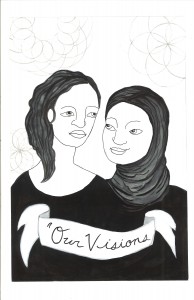When Prison Abolition Was A Feminist Concern…
Once upon a time, not so long ago, people who identified as feminists cared profoundly about prisoners and prisons. They were at the forefront of advocating prison abolition. Things changed…
I decided to share this great reminder from 1971 in the radical feminist publication “Off Our Backs (PDF)” when it was still a newsletter. Below are some excerpts from the publication that includes an essay about prison abolition.
Women Prisoners Revolt
In support of their brothers at Attica and the 28 demands they made, the women incarcerated at Alderson demonstrated peacefully on Tuesday, September 14. The demonstration developed into a total strike with the women refusing to return to their cottages. Later they met with representatives of the federal prison parole board and presented additional demands including fair wages for work performed in the jail (they presently receive 7 cents an hour); mail privileges; and treatment facilities for addicts. Frustrated by the out-of-hand rejection of their demands and the harsh and adamant attitude of the prison officials, the women rioted. Tear gas was used. They were all then locked into the cottages. Three sisters “escaped” from the rooms to tell the press what had happened.
Unprecedented actions have been taken against the women who presented the demands. Sixty-six of them have been transferred to to a male youth reformatory in Ashland, Ky. Additional male guards (there are usually * 60) now patrol Alderson to enforce “order.” Authorities will not release the names of women who have been transferred or say where they will be sent now.
How Many Lives?
How many years of people’s lives must be lost, hidden, and brutalized, before we see that prisons must be abolished?
How many Atticas, San Quentins and Aldersons will it take till we realize that our society has created these monstrous institutions out of fear — fear of human freedom, cultural differences, loss of capitalist property. The ethics of our society have been distorted by this fear, and are then imposed on non-white people, poor people, young people and women to make survival and experimentation crimes. Why should people in Amerika spend years in jail for such “immoral” acts as smoking grass, getting drunk and singing in the streets, making love or printing “obscenity”, much less for standing by moral decisions not to kill or work for an immoral government? If prisons were really to protect us from psychopaths, murderers and thieves, they would contain Nixon, Rockefeller, Mitchell, Reagan, Agnew, owners of motor industries and oil dynasties, slum land lords, church leaders, and Pentagon officials. Prisons are the extreme domestic example of the racism, sexism, militarism and imperialism that we have been watching for years in Vietnam.
Who needs “rehabilitation” in our society? Not the slaves of ghetto deprivation and drugs pushed by those who wish to dull possible insurgency. Not the men and women who have learned to hustle and survive despite all efforts to destroy them. Not revolutionaries like Angela Davis and George Jackson. The people who need to be “rehabilitated” (if that’s even a correct attitude to have toward any human beings) are those whose minds and bodies have been warped by false value systems that convince them that some people must die so they can live, many must starve so they can eat, all must slave so they can enjoy rest.
“Rehabilitation” is the pacification program of liberalism. Even if we did want to “rehabilitate” sick or deviant minds or bodies, prison would be the last place to achieve it. We need to rid our selves of prisons. They are a danger to society not only because they are schools for “crime” (70% of all “crimes” are committed by ex-convicts) but because they try to erase from our consciousness people who could possibly bring about exciting changes in our social order. We need women like Angela Davis, Erica Huggins and Madame Ngo Ba Thanh among us. We need the Puerto Rican revolutionaries locked inside Alderson.
To abolish prisons we may have to develop “reforms” that carry within them contradictions that will make it hard to achieve them without drastically changing prisons — black prisoners’ unions with collective bargaining power, ending detention before conviction, a national prisoner monitoring system, open door policies, viable alternatives to incarceration. But whatever approaches are used, the goal should be prison abolition. To have no alternative at all would be better than to continue the present reality. And we can’t wait for the ending of racism, sexism and poverty in this country before we begin tearing down the walls. It may be in our own self-interest.
The question on the table: which current feminist publication can you imagine would publish such words?

